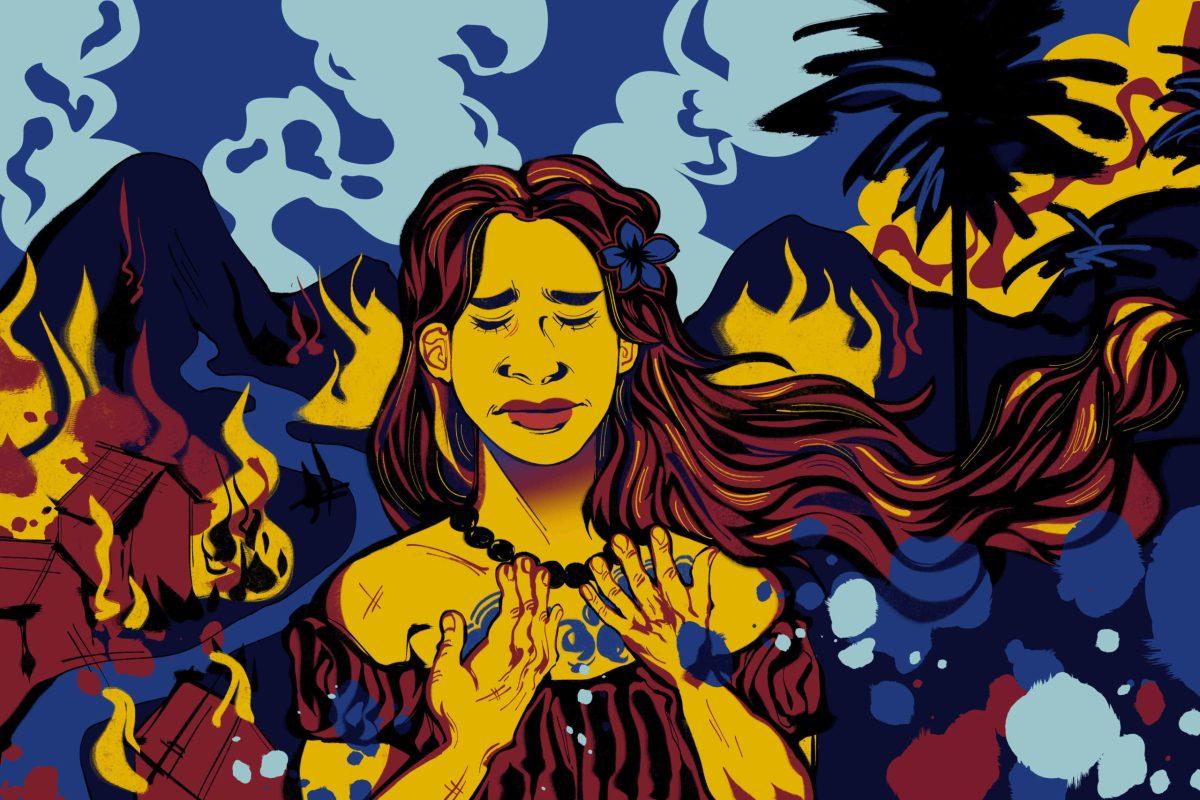The Hawaiian firestorm on the island of Maui on Aug. 8 is one of the worst disasters in the archipelagos since the 1944 West Loch explosion, and as corporations take over the indigenous land of thousands and tourism reopens Oct. 8, natives need help now more than ever.
The Maui disaster was the deadliest American wildfire in modern history, with 97 people dead, nearly 2,200 homes and buildings reduced to ash and centuries of history and artifacts in Lāhainā, one of the last symbols of Hawaiian sovereignty and native culture, lost to the fire. In a wave of loss and grief, predatory real estate investors have attempted to encroach on native land since news broke out. As it stands, nearly 7,300 people are staying in 32 hotels across West Maui, and despite the governor promising on Sept. 15 that Natives wouldn’t be kicked out of hotels in favor of tourists, many received letters that they would be removed Sept. 30, leaving many homeless and bitter of incoming tourists.
You may not have heard about this natural disaster; after all, tourism companies and mainstream media want you to imagine lively hula dancers and pristine beaches when picturing Hawaii. It’s true that 70% of Maui’s economy and nearly half of its residentail employment relies on, according to a 2021 report, and the two months this summer without visitors has economically drained the archipelago state. The governor and the Hawaii Tourism Authority are actively encouraging tourism in parts of Maui. But while the money gained from tourism may benefit the state of Maui, that will primarily be going to owners of resorts who are higher class. The average citizen in Maui works menial hospitality jobs. If tourism opens before essential services like childcare open, they will be stuck in a double bind.
If a firestorm engulfed someone’s neighborhood and home, destroying everything they owned and generations of their family’s history, they would likely be emotionally destroyed and in search of shelter. What if amongst this turmoil, instead of receiving support, they were kicked out of their shelter so that rich tourists could pose and laugh over their family’s graves? Unfortunately, that remains a hint of the reality of what the Maui people are experiencing during a natural disaster combined with powerful forces of corruption and corporate greed, leaving water and food scarce for thousands, even after two months of wildfire. What Maui locals need is time to recover from this natural disaster. Tourism during this time will only benefit rich tourists and resort owners, and harm average locals who need time to recover and heal before springing back into work.
Although west Maui — hit hardest by the fires — will be off limits until Oct. 17, residents have described the rest of Maui opening as a slap in the face. Tourism has already contributed to the environmental destruction that enabled the fires to spread so fast in the first place, not to mention outsiders’ general lack of discretion; tourists have already posted pictures posing in front of what are now gravesites. Uncertain residents returning to hospitality jobs have said the island isn’t ready, as childcare, schooling, housing and mental health programs won’t be available until days or weeks after tourism reopens.
Many residents have been critical of federal support, with each native receiving only $700 per household rather than per person, totaling $1.9 million approved by the White House which is included in the overall $5.6 million FEMA has spent so far. This is less than the average stimulus check. Additionally, the island of Maui was already the fifth-highest state in homelessness, and now with 78 shelters in ash, thousands of natives are displaced across the islands.
This only describes the tip of an incredibly complex and cruel situation. There are several reasons why you should help, and why these petitions are so important. Even college students in Texas can help the natives in their battle against limited resources, unemployment and corporate greed.
While students shouldn’t take an impulsive trip to Maui during the school year, spreading advocacy and awareness to travelers can help make a difference to respect grieving natives. Even if you can’t donate or sign a petition, you can always provide advocacy. Even if you don’t support Hawaiian sovereignty, you can support Americans trying to return home.
Students can support by donating water, food or money to nonprofits. Verified groups include the Salvation Army, the Maui Food Bank, the Council for Native Hawaiian Advancement, The University of Hawaii Foundation and the Hawai’i People’s Fund. Understandably, many students may not have the resources themselves to provide charity, however, the voices of students thousands of miles away can be just as powerful with the help of sharing and signing petitions. As the Hawaiian Sovereignty Movement grows, natives push for self-sufficiency and circulating petitions include a motion to stop “land snatches,” a petition to push back the return of tourism until residents are ready and a petition to stop water theft by real estate developers. Even Texans can help sign these petitions to support Maui residents secure their land before it opens to outsiders.
It only takes a few minutes to help.







